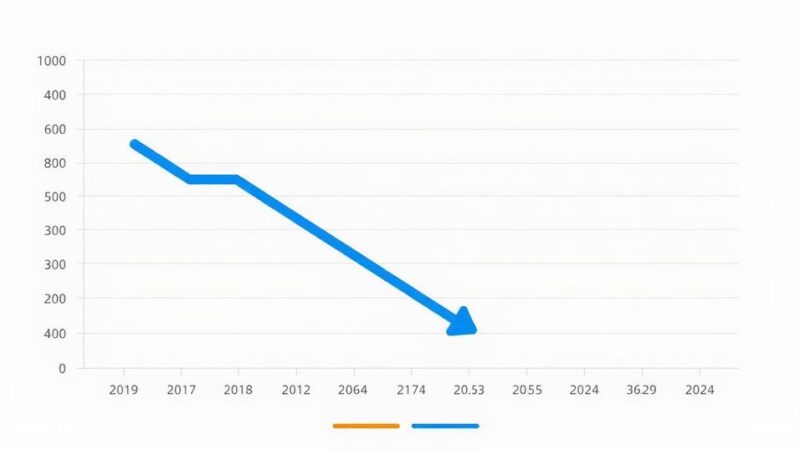India and Bangladesh have imposed reciprocal trade restrictions following heightened tensions. Bangladesh restricted land imports of cotton yarn from India after India halted a key transshipment facility. These actions indicate deteriorating relations due to ongoing political issues, notably involving former Prime Minister Sheikh Hasina. Businesses are concerned about the economic consequences, as delivery routes become costlier and slower amid strained diplomatic ties.
Businesses in India and Bangladesh are bracing for the fallout of newly imposed trade restrictions, stemming from escalating tensions between the neighbors. Last month, Bangladesh limited land imports of cotton yarn from India to protect local industries from cheaper foreign products. This decision followed India’s abrupt cancellation of a transshipment facility that allowed Bangladesh to export goods through Indian ports, citing congestion issues.
Relations between India and Bangladesh have soured significantly after the ousting of former Prime Minister Sheikh Hasina in August. Currently, Hasina is in exile in India, with a new interim government led by Nobel laureate Muhammad Yunus in power. Amid these political upheavals, Dhaka is requesting that India extradite Hasina to face multiple serious charges. Notably, Hasina has denied these allegations, and the Indian government has refrained from responding to the extradition request.
Moreover, India has voiced concerns regarding reports of violence against Hindu minorities in Bangladesh, repeating claims that this reflects a disturbing trend of systematic persecution under the interim government. Bangladeshi officials have consistently denied targeting minorities, attributing most occurrences to political motives or crime. It is worth noting that Hindus represent a minority with less than ten percent of Bangladesh’s 170 million population.
As trade relations continue to fray, businesses are starting to tally the costs. Cotton yarn, crucial for Bangladesh’s extensive garment manufacturing sector, is still accessible via sea and air transport, but these methods are considerably slower and more expensive compared to land routes. Last year, India exported approximately $1.6 billion worth of cotton yarn to Bangladesh, a significant portion of which utilized land access.
The now-defunct transshipment facility previously enabled Bangladesh to send apparel for global brands to Indian cities, allowing for expedited delivery to markets in Europe and the United States. “It’s a blow to Bangladesh’s fast-fashion export industry,” states Anis Ahmed from MGH Group, noting that deliveries which would take a week via India can now span up to eight weeks by sea.
Bangladesh, recognized as the world’s second-largest garment exporter following China, reported clothing exports exceeding $38 billion in the last year, with over a billion traveling through the now halted India route. Additionally, logistical challenges such as limited air freight capacity continue to hamper direct exports from Bangladesh.
Analysts suggest that India’s decision to revoke the transshipment facility might be a counteraction against comments made by Yunus during a visit to China, where he discussed regional dependence on Bangladeshi geography. This stirred alarm in India, particularly given its historical vulnerabilities in the region, including borders with potential adversarial states like China. Indian defense experts fear that any strategic misstep could threaten access to the northeastern states, bordered by Bangladesh.
Tensions are further inflamed by strained visa policies, with the issuance of travel permits plummeting over 80% since Hasina’s ousting. Previously, annually up to two million Bangladeshis visited India for a range of purposes, including tourism and healthcare. This sudden drop in mobility exacerbates historical grievances.
Following rising tensions, India’s garment manufacturing association has proposed a ban on imports of Bangladeshi garments by land. Experts point to an overall counterproductive nature of increasing trade barriers. “A strong sentiment in Bangladesh suggests reassessing transit facilities granted to India, given the current climate,” comments Debapriya Bhattacharya, an economist from Dhaka.
Trade and economic ties continue to be affected negatively amid a broader geopolitical shift, particularly evidenced by growing connections between Bangladesh and countries like Pakistan. For context, Bangladesh’s foreign secretary made the first visit to Islamabad in 15 years, though upcoming meetings have been postponed due to ongoing tensions in Kashmir.
The tense exchanges between India and Bangladesh are influencing public opinion and increasing sentiments against India within Bangladesh. With long-standing ties seemingly eroding, analysts express concern that a failure to manage these tensions could significantly harm trade relations and economic cooperation.
The recent imposition of trade restrictions between India and Bangladesh highlights the escalating diplomatic tensions, significantly impacting businesses. Steep declines in cotton yarn imports and tighter travel regulations have further complicated trade pathways. Analysts urge both countries to prioritize economic collaboration amid rising geopolitical concerns, as values of mutual benefit may be overshadowed by political grievances. If tensions remain unaddressed, the future of their economic relationships appears increasingly precarious.
Original Source: www.bbc.com






